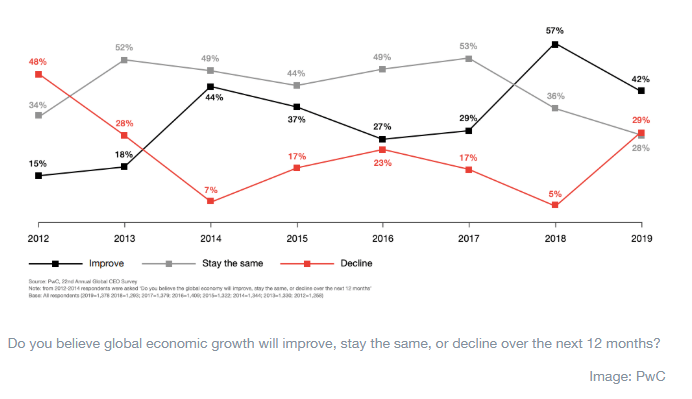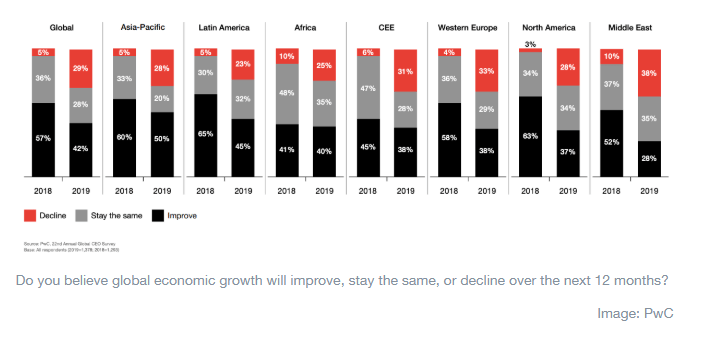Since 1997, PwC has been taking the temperature of chief executives’ confidence around the world. The outlook this year is inescapably pessimistic.

Of course, this year’s responses are cast in a challenging light chiefly because the year before saw record levels of optimism. In 2018, 57% respondents were feeling upbeat and only 5% expected to see a decline. Now it’s 42% expecting an improvement and 29% expecting a decline.
Also Read: 4 ways leaders can build courageous and passionate teams
Despite the lines on the chart converging, it’s worth noting that far more CEOs expect growth to improve than anticipate it falling back. The chart also reveals a trend toward polarisation, with those anticipating parity being the smallest group. This will be one to watch for next year.
An even distribution of caution

The trend toward pessimism is fairly uniform, regardless of region – from 23% in Latin America to 38% in the Middle East. North America saw the largest fall in the number of CEOs expecting things to improve, from 63% last year to 37% this year. While there are many factors at play here, there is one to pay particular heed of, the report’s authors say.
Also Read: World leaders at Davos rush to defend globalisation & multilateralism
“International trade tensions, political upset and uncertainty, and stricter monetary and fiscal policy all play out differently but with the same general result across regions: a more cautious outlook on global economic growth.

“All over the world, we have seen populist politicians exercise increasing influence over economic policy. There is a perceptible shift away from reliance on global governance structures designed to facilitate cooperation on pressing issues such as trade, climate change, and nuclear proliferation.”
As a consequence of which, a growing number of countries are adopting a position of nation-state unilateralism, turning away from globalization, as discussed in the World Economic Forum’s Global Risk Report.
Also Read: 2018 was the year of the woeful world leader
A reliable predictor?

An interesting trend reveals itself when looking at the results of the last 10 years’ of CEO Survey responses. It transpires that global CEO attitudes toward their own organization’s performance are quite accurate at forecasting the state of the global economy over the coming 12 months.
It is less straightforward to ascertain how causality fits into this picture, however. Are the CEOs able to see what is coming over the economic horizon, or do they act cautiously in times of uncertainty, thereby reducing their own impact on the economy? Whether we are looking at a prediction or a self-fulfilling prophecy though, the outcome is clear to see in the data.
Sean Fleming is a senior writer at World Economic Forum.
This article was first published in World Economic Forum.






